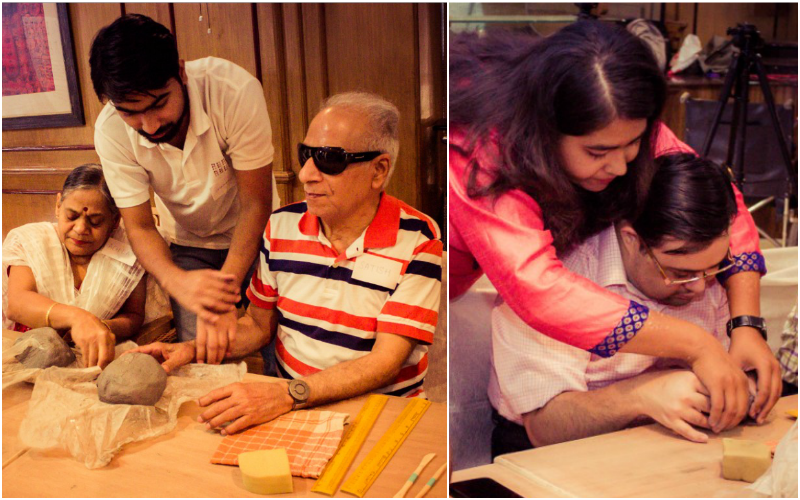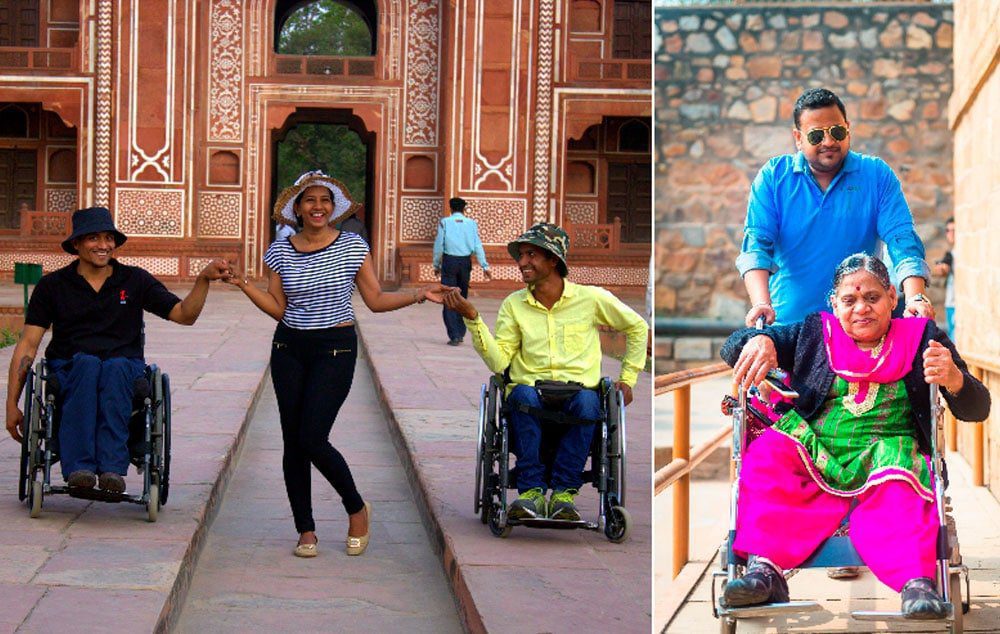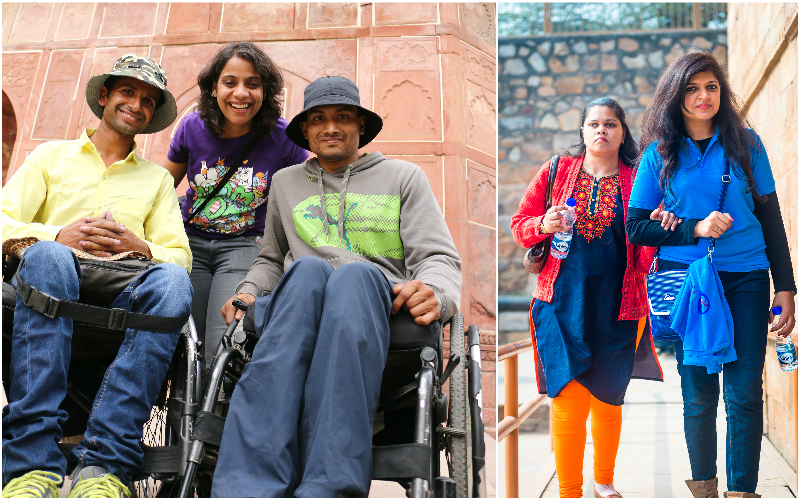Meet Rahul, an operations manager with a leading IT company. He goes regularly to office and comes back home, stays in the house all weekend, in the confines of his wheelchair, writing short stories or watching movies.
Meet Rupmani, ever smiling and living life to the fullest. With every event or talk posted on Facebook, she posts a comment, “Is there a sign language interpreter?”
Meet Bikash, a government officer who craves the wanderlust, and a little ‘me time’. But his family doesn’t let him go anywhere, and if they do, they accompany him. Because Bikash is blind.
Last but not the least, meet Anirban, a bank manager with a photogenic smile. Anirban loves to talk but sometimes people have to make a bit of an effort to understand him as he has cerebral palsy. His mom is afraid that people’s ignorance towards him might affect his self-confidence, which is why he hardly goes out.
Being the daughter of a father, who is blind and a mother who uses a wheelchair, I know the limitations that exist in terms of social interactions for a person with a disability. At a public gathering, people drift into groups and for a blind person, it is difficult to detect that. For those in a wheelchair, if you are not wheeling yourself around, or if venues are inaccessible, reaching out to people of your interest is tough. Similarly for a deaf person, the biggest barrier is communication. Without sign language, you would just be tapping on everyone’s shoulder and writing things down on your phone or a piece of paper, to communicate!
That’s why I started Planet Abled, an organisation that makes travel accessible to all. We create an inclusive environment and a platform, which gives people with disabilities and without medically-certified disabilities, an equal chance to make new friends, pursue their interests and explore the world.
Through Planet Abled, Rahul’s weekends are now spent going to heritage tours, food festivals, meet-ups, and exploring Delhi, the city he has been living in, all his life. Rupmani has made new friends at our accessible tours where there is no communication barrier, as we always have the presence of a sign language interpreter at hand. She recently attended a talk on the evolution of Delhi and didn’t feel out of place at all. Bikash gifted himself a solo trip across Uttarakhand on his birthday, breaking the shackles of his regular environment and making his dream come true. And Anirban now enjoys himself during tours and at workshops, where no one judges him. He makes so many friends now and chit chats with them for hours!
 Engaging in activities and workshops
Engaging in activities and workshops
Moment Of Truth
As a child, my family and I didn’t travel much outside Agra, the city I grew up in. Local excursions were also limited. But I did have a regular middle class upbringing. Both my parents had government jobs, and their disabilities didn’t matter since we lived with it from the day we were born.
As for this being a constraint, I would say, it made me the person I am today. From an early age, I had to engage in things and accompany my parents to places a regular child won’t ever get exposed to. It’s not that they couldn’t manage without us but they gave us this real-life training deliberately so we would become independent and mentally tough.
When we grew up and took the initiative to travel as a family, each trip threw up newer surprises due to inaccessibility and various other issues. I figured that if we faced these problems, perhaps others felt the same way? The moment this struck me, each day at my fulltime job became more and more difficult. I was working at Adobe as an Account Manager, and no doubt, my cushy job paid the bills. But in the end, my life’s calling won, and in November 2015, I took the plunge and started this journey called Planet Abled.
The Wanderlust
In a country, where people with disabilities are often marginalised; inaccessibility, lack of basic amenities and people’s insensitive attitudes are just some of the barriers, they face when travelling to unknown territories. Planet Abled is keen to change this.
Working around the concept of universal design where everyone travels together without any discriminatory parameter, we want to transform people with disabilities into avid travellers and create a platform for inclusive tourism, alongside. We want to create avenues for them to visit places freely and confidently, leaving behind social inhibitions and apprehensions about their capabilities.
So, whether they want to travel solo, or with family and friends or want to be part of our experiential tours, their disability should never stop them from taking that plunge, and that is what Planet Abled aims to enable. We customise tours, so that any person is fully able to enjoy and experience new places and cultures.
What Makes Travel Accessible?
Accessible infrastructure is not limited to building ramps for wheelchair-users. It means braille and audio signages at all places, written directions everywhere for the deaf and mute, and most of all, making the web accessible for all. We face a lot of challenges while organising tours, and two major ones are lack of physical and technological infrastructure, and the attitudes of people.
For instance, at a UNESCO world heritage site, which claims to have accessible toilets, the toilet is there but it was locked! It took us two visits to find out who had the key. When we finally managed to get it opened, it turned out to be just another toilet with wide doors and no handle bars for commode transfer by a wheelchair user. The men could manage somehow but we literally had to lift a lady up for transfer. In many places, there are steps but no ramps. To solve this problem, we have procured a portable ramp to make the place accessible for wheelchair users to some extent.
When it comes to technology, most common websites are not accessible via a screen reader for the blind. The most popular ticketing portal in India, which we used earlier to make bookings, is not accessible. I raised my concerns with the founder, who committed to doing something about this. However, it has been six months and nothing has changed. Being from a tech background, I know that it is no rocket science. There just needs to be a willingness to change things.
With regards to attitudes, when we go out in groups to public places, people often gawk at us. It’s a very particular kind of look – like as if they have seen aliens! At times, they pass petty remarks, too. The solution to this, is to just be seen more in public spaces and travel destinations, so that ‘seeing people with disabilities’, becomes a ‘normal’ sight.
Travel Unlimited
With rising literacy and exposure to international scenarios, and NGOs and activists raising their voices to the authorities, society is gradually becoming aware of the accessibility parameters, and the issues faced by people with disabilities. Even the Accessible India Campaign launched by the government has raised hopes for an accessible India. But all of this is a very slow process.
In the meantime, I believe we can find solutions in small ways. Over-protective and sympathetic families should let a person with disability venture out and lead as mainstream a life as possible.
I have also observed that some of our volunteers have never interacted closely with a person with a disability their whole life. But through our activities, they have started to understand the various aspects of accessibility closely and have even started forging friendships. I believe that inclusive education can bridge this gap early on, for future generations.
Saint Augustine said, “The world is a book and those who do not travel, read only one page.” Well, this is my only submission – why should some people miss out on reading the most beautiful chapters of life just because they have a disability?
Source: YKA




